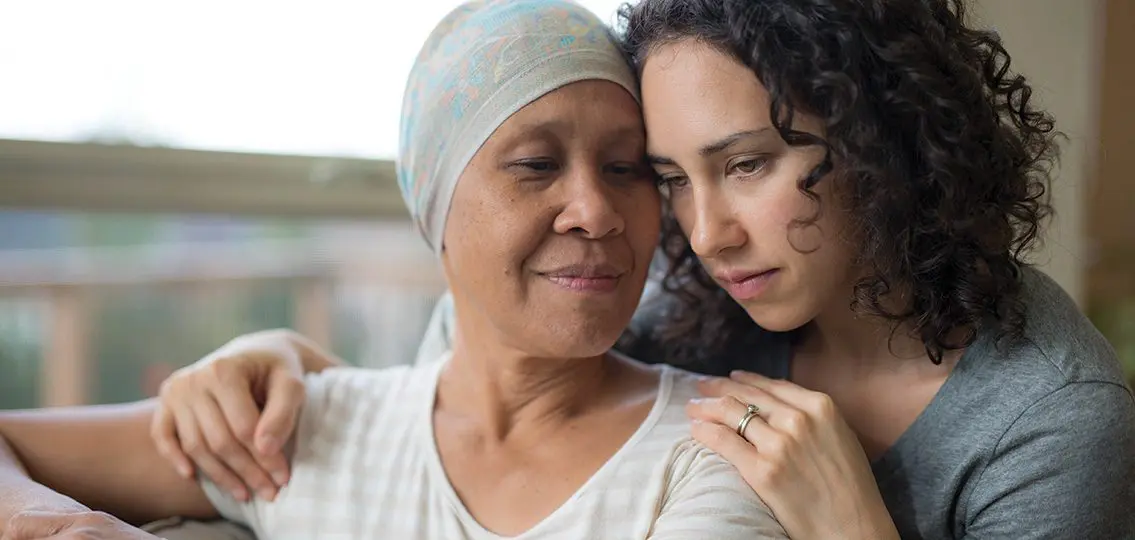My oldest daughter sat up tall, both hands on the steering wheel, ready to take her Ohio driver’s license test. I sat in the passenger seat, and the examiner reminded me that my daughter would receive an automatic fail if I spoke. She put the car in drive and released her foot from the brake.

She’s going to be fine, I thought, and a familiar uneasiness returned.
Five months earlier, I had repeated that same mantra, struggling to convince myself of its truth.
I was sitting on a long stretch of quiet beach on Anna Maria Island, Florida, more than 1,100 miles away from our suburban Cleveland home. I watched my daughter wade waist-deep into the ocean. It was Wednesday, June 10, 2020, and she and I had spent the previous five days pretending that we were on a vacation.
She’s going to be fine.
I thought it over and over, my daughter sashaying farther into the crystal blue Gulf waters. The next morning, she would be in an operating room undergoing surgery to have a tumor removed from her spinal cord.
My husband and I were blindsided three weeks earlier when an MRI revealed the tumor.
Our daughter had acute nighttime pain in January, but she was also a competitive high school swimmer with a history of scoliosis. Her doctors chalked it up a possible herniated disc and proceeded with physical therapy and medication to relieve the pain. But when the pain returned in late April—after several weeks of a statewide COVID-19 lockdown, remote school and no swimming—her doctor ordered an MRI for a closer look.
Intramedullary spinal cord tumors, those that arise within the substance of the spinal cord, are rare and the surgery to remove them is precarious. The success of the surgery depended on the skill of the neurosurgeon and the complexity of the tumor. It made for a murky prognosis. Best case, most of the tumor could be removed and the surgery would leave our daughter with short-term neurologic and motor deficits. Worst case was paralysis on one or both sides from the tumor site down. And then there was everything in between.
Even the most experienced neurosurgeons we saw admitted that they performed one, maybe two, of these tumor resections in pediatric patients each year. So when we asked for second opinions, they all pointed us to a doctor at the Johns Hopkins Children’s Hospital in St. Petersburg, Florida. He was the expert in removing spinal cord tumors, they told us.
“If it doesn’t break the bank, then I would go,” was one doctor’s candid response when I asked what she would do if it was her child.
We were lucky. The Florida doctor was in-network and my insurance fully covered the surgery.
So we made the decision to drive to St. Petersburg in the middle of a pandemic so we could take the best shot our daughter had for a positive outcome.
The summer sun was intense on the Anna Maria Island beach that day and I joined my daughter in the water. It was only a few hours before we had to leave for the airport to pick up my husband. He’d stayed behind to be with our younger two daughters while our oldest and I headed south to attend a series of pre-op doctor’s appointments in the days before surgery.
I crossed the white sand into the ocean and made my way closer to my daughter. I dunked under and swam to her side.
“I’m gonna try and take a few strokes,” she said. I watched as she took one stiff stroke of freestyle with her right arm, then attempted a half with her left. She stopped suddenly and came up. “Nope,” she said. She flashed a smile, but shook her head. “Can’t do it. It definitely hurts.”
My heart ached and anxiety overwhelmed me. In February, my husband and I had cheered her and her teammates on in the 200-yard freestyle relay at the high school state championship meet. That she had this tumor still seemed surreal.
She’s going to be fine.
The next morning, I followed behind two nurses who wheeled my daughter down the hospital corridor.
“This is where we split,” the nurse said to me, stopping next to a set of doors.
I looked down at our daughter. Her eyes were wide and wet around the edges. She hadn’t cried in front of me since her diagnosis.
“I love you,” I bent over and gave her a kiss through my mask on her forehead.
I wanted to be encouraging and to tell her out loud, “You’ll be fine.” But I didn’t.
My husband and I had done our best to stack the deck in her favor, but the circumstances were beyond our control. I couldn’t bring myself to say something that might not be true.
The nurse hit the door pad and pushed my daughter away to the operating room.
A few hours later, we got the good news we’d hoped for: The doctor successfully removed most of the tumor—a low-grade astrocytoma, we learned—and despite some expected temporary deficits, she was, indeed, going to be fine.
With the assistance of a walker, our daughter left the hospital three days after the surgery. She had weakness in her right leg and foot and numbness on her right side, but with time, patience and physical therapy, she recovered her way back to the life of a typical teen.
In July, we celebrated her sixteenth birthday. Then in August, she began her junior year of high school. In September, she returned to swimming. And on that November afternoon, I quietly sat next to her in the bureau of motor vehicles parking lot, where she’d just completed her driver’s license test and where, together, we waited for her results.

The examiner approached her side of the car, clipboard in hand. “How do you think you did?” he asked her.
Unsure and still nervous, she hesitated, “OK… I think?”
The examiner’s eyes smiled at me above his mask and I nodded back.
This time I knew for sure: She was going to be just fine.




